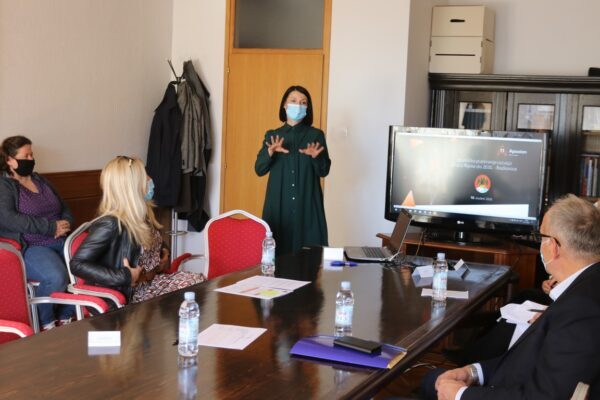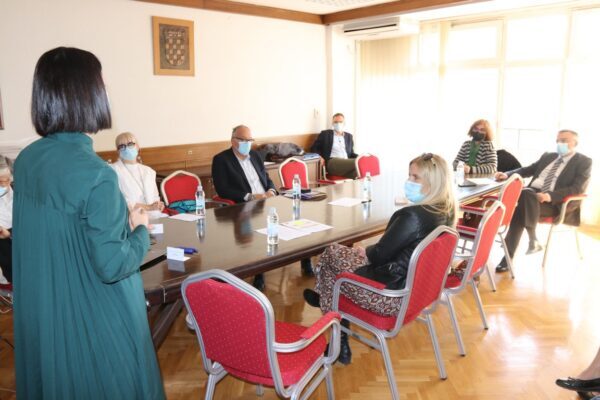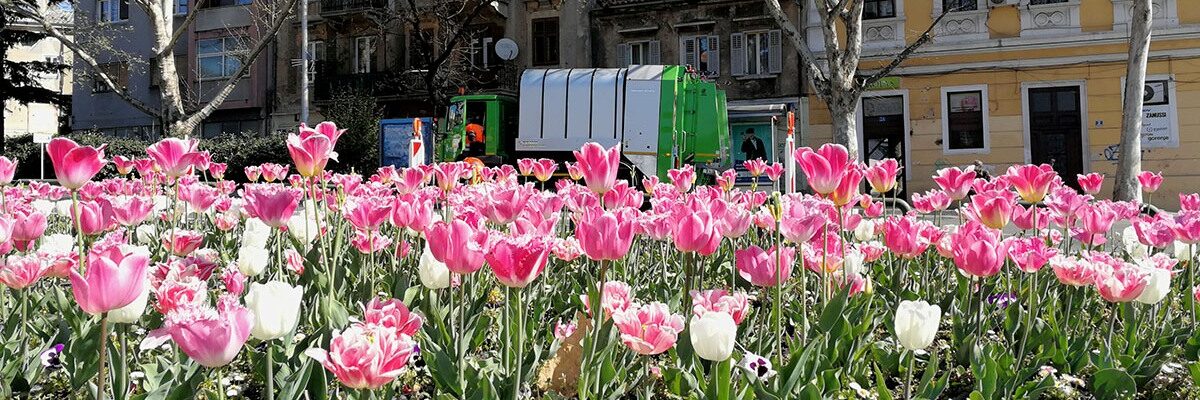It is important to think carefully about how to manage the city space in the future. Over the next 10 years, Rijeka must position itself in a sustainable manner within a limited territory, continuing to convert its existing premises as it has done so far, by using and revitalising its cultural and industrial heritage. Under the given conditions, Rijeka strives to green its area, to make more accessible public and private green areas that will make the city more pleasant and healthier.
Like all large cities, Rijeka is facing the need to provide the highest quality utility services, responsible, efficient and financially available waste disposal, water supply and sewage systems. In the coming decade, all major cities will focus on clean forms of energy, where Rijeka can remain a leader as a smart and green city.
The city should continue to connect with its hinterland and surroundings in Kvarner and islands through short supply chains, encouraging local production and quality and healthy food supply.
The following are the topics included by this segment:
- Waste disposal,
- Water supply and sewage,
- Spatial planning,
- Reuse of existing unused premises (circular space management),
- Green infrastructure,
- Maintenance of city areas,
- Connection with the hinterland and healthy food supply,
- Urban agriculture and
- Others
Workshop with the professional public
 On 10 November 2020, a workshop with the professional public was held tackling the topic “Maintain Rijeka 2030” as part of the strategic planning process for the development of the City of Rijeka and the methodology envisaged for drawing up the Development Plan of the City of Rijeka 2021 – 2027 in the next period, in the context of utility services and infrastructure, spatial planning, telecommunication infrastructure and the implementation of the Smart City concept in city development.
On 10 November 2020, a workshop with the professional public was held tackling the topic “Maintain Rijeka 2030” as part of the strategic planning process for the development of the City of Rijeka and the methodology envisaged for drawing up the Development Plan of the City of Rijeka 2021 – 2027 in the next period, in the context of utility services and infrastructure, spatial planning, telecommunication infrastructure and the implementation of the Smart City concept in city development.
The topics in a form of group work and discussion were addressed through three issues related to:
- challenges and needs in relation to the topic (current situation),
- vision and opportunities for the development of the segment (desired state),
- key projects and activities to achieve the desired direction of development (how to achieve this).
The following key challenges and opportunities for Rijeka were spotted by participants: In relation to utility infrastructure and the attitude towards the environment, Rijeka is at a high level, but there are elements that will need to be addressed in the next period. Rijeka is well supplied with water resources, but its sewage system insufficient. In relation to waste management, the collection and treatment system is satisfactory, but there are challenges in the field of waste management, which are not completely solved even at national level. Residents are only partially aware of the importance of household waste management and the concept of the circular economy.
Rijeka has an excellent location, ideal for living and communication. However, it is a seaside city that is separated from its coast by the industrial zone that is in a large measure out of function. Due to the limited and hilly terrain, getting around the city in traffic and on foot is difficult and slow. Although it is known for its inclusiveness and good cultural and public life, all quarters do not offer equally good social infrastructure and dynamics.
 Telecommunication infrastructure in Rijeka that enables broadband Internet access is well developed in relation to the national goals that define this area of urban development by 2020. The coverage of the mobile wireless access signal is satisfactory, especially in the context of the fact that part of Rijeka, by using dynamic spectrum sharing, has recently been covered by the 5G network. If we combine the possibilities of fixed and mobile internet access, Rijeka is almost 100% covered by a network that enables speeds of 30-100 Mbit / s, however such speeds can never meet the needs of citizens and the economy of Rijeka in the next 10 years. Unfortunately, the national goals for 2020 were not ambitious enough and today Rijeka is only partially covered by fixed broadband access of 100Mbit / s or more. This is a limiting factor of development and it is necessary to plan for the next ten-year period the application of technologies that will provide interested citizens and all businesses in the entire city area speeds of 1Gbit / s and more.
Telecommunication infrastructure in Rijeka that enables broadband Internet access is well developed in relation to the national goals that define this area of urban development by 2020. The coverage of the mobile wireless access signal is satisfactory, especially in the context of the fact that part of Rijeka, by using dynamic spectrum sharing, has recently been covered by the 5G network. If we combine the possibilities of fixed and mobile internet access, Rijeka is almost 100% covered by a network that enables speeds of 30-100 Mbit / s, however such speeds can never meet the needs of citizens and the economy of Rijeka in the next 10 years. Unfortunately, the national goals for 2020 were not ambitious enough and today Rijeka is only partially covered by fixed broadband access of 100Mbit / s or more. This is a limiting factor of development and it is necessary to plan for the next ten-year period the application of technologies that will provide interested citizens and all businesses in the entire city area speeds of 1Gbit / s and more.
The City of Rijeka set up the company Smart Ri which manages a cluster of entities from the private and academic sectors with the aim of realising the project Competence Centre for Smart Cities. The city is an urban area where cluster members test their solutions in the processes of research and development of new products and services.
The informatisation level of the city administration is very high, which is objectively confirmed by independent analyses and a number of awards received by the City of Rijeka during the previous period. Modern technologies (internet of things, artificial intelligence, processing of large amounts of data) offer additional great opportunities for digital transformations of the public services provided by the utility companies of the City of Rijeka.
At the workshop the vision of the city’s development was defined in the key areas that were under review. The participants want to see Rijeka in 2030 as a city that is fully networked in a modern and clean water supply and sewage system with 99.9% connections to the water supply, 90% connection to the sewage systems, while the remaining 10% of households in isolated elevated areas have in other environmentally friendly manners solved the sewage problem. The city has a separate waste collection system with underground containers and manages all types of waste in an environmentally friendly manner.
Its residents are educated and apply the principles of the circular economy in a responsible and conscious manner in everyday life, so the total amount of waste produced is falling down.
The city has many green areas and other green infrastructure that mitigates and prevents the effects of climate change and makes it a more pleasant place to live. The city relies on energy efficient forms of transport (e.g. electric vehicles) and housing (renewable energy sources in buildings and private homes.)
In 2030, Rijeka is a city open to the sea in which the former industrial zone between the sea and the centre has been revitalised and is open to citizens, tourists and small businesses. It has a highly developed community spirit and a high quality of life in quarters with which people identify, where they have access to public and commercial facilities, greenery and other forms of public life without the need to use transport, which encourages them to local action, connection and participation and it makes Rijeka a more attractive place to live. Traffic flow in Rijeka is smooth, environmentally friendly, fast and pleasant. Citizens use environmentally friendly and healthy forms of transport, within the limits allowed by the height difference of the Rijeka area. The city has premises at its disposal by using and revitalising the existing facilities and industrial and cultural heritage, which are brought back to life. The participants imagine Rijeka 2030 as a regional Smart City Hub in which companies from all over Europe test and implement their solutions, so they prefer it for establishing business. This is due to the fact that it represents the gigabit society with an exceptional quality and efficient telecommunication infrastructure. Utility and transport infrastructure is equipped with sensors, and applied artificial intelligence in management is in accordance with the best standards of technological development. City administration services are fully digitised. Citizens are digitally educated and actively participate in management and creative processes in the city using digital technologies, while direct forms of live interaction that ensure quality social dynamics are still open. As a topic that is important for the quality realisation of all identified ambitions in city development, the participants highlighted the promotion of active citizenship, cooperation in neighbourhoods, personal responsibility for the city, citizenship involved in the creation and implementation of solutions prepared by the city.
WORKSHOP PARTICIPANTS:
- Andrej Marochini, utility company Vodovod i kanalizacija
- Jasna Kukuljan, utility company Čistoća
- Helena Traub, Žmergo association
- Mirna Dujmović Cerovac, Disinsection
- Lovorka Bilajac, Faculty of Medicine, Rijeka
- Adam Butigan, Institute of spatial planning of the Primorje – Gorski Kotar County
- Alan Štimac, DARH2 for architecture and acoustics
- Eda Rumora, City of Rijeka
- Željko Jurić, City of Rijeka
- Radmila Rakas, Transition initiative Rijeka


